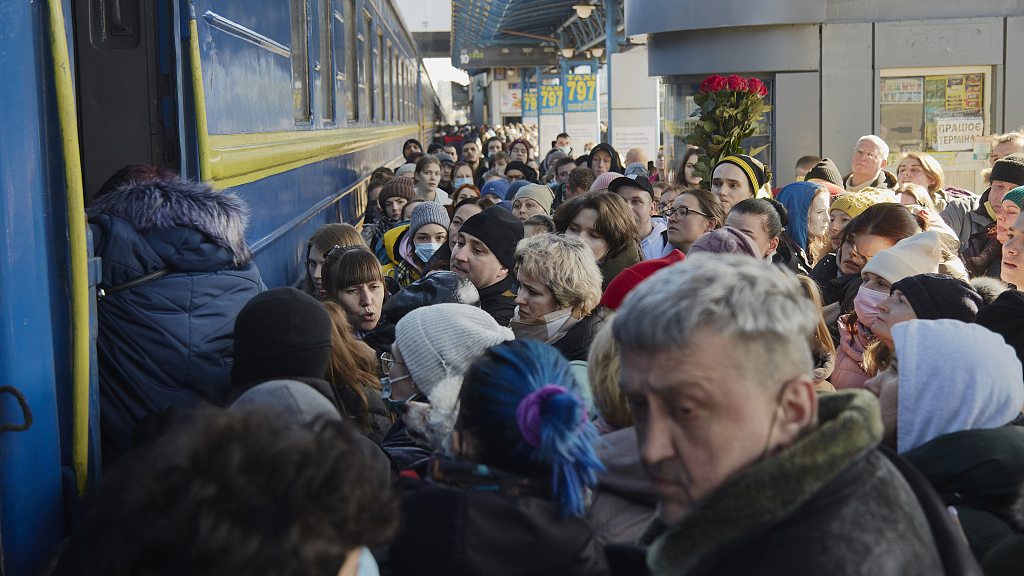
Local residents are boarding an evacuation train driving to the west of Ukraine, in the Ukrainian capital of Kyiv, February 26, 2022. /CFP
Local residents are boarding an evacuation train driving to the west of Ukraine, in the Ukrainian capital of Kyiv, February 26, 2022. /CFP
The ongoing military conflict between Russia and Ukraine has been the top story in most international media outlets drawing wall-to-wall coverage for over a week now.
However, several news outlets, particularly the Western media, are being criticized and condemned for the evidently racist undertones in their coverage of the unfolding humanitarian crisis that tend to amplify empathy for European victims while normalizing the sufferings of war and disaster in other regions such as Middle East, Africa and Afghanistan.
While there's a genuine uproar on social media platforms such as Twitter and Facebook calling out the racist media biases triggering a positive debate within the Western media fraternity on the subject, two journalists' bodies from Africa and the Middle East have issued strongly-worded statements to register their protest while advising the media organizations to get past "American- or Euro-centric biases."
"The Foreign Press Association, Africa (FPAA) is disturbed by the unfortunate opinions that our Western colleagues continue to publicly express about the distinction they see between war and suffering in Ukraine and those that have taken place in poor countries," the Kenya-based journalist body said in a statement released Tuesday.
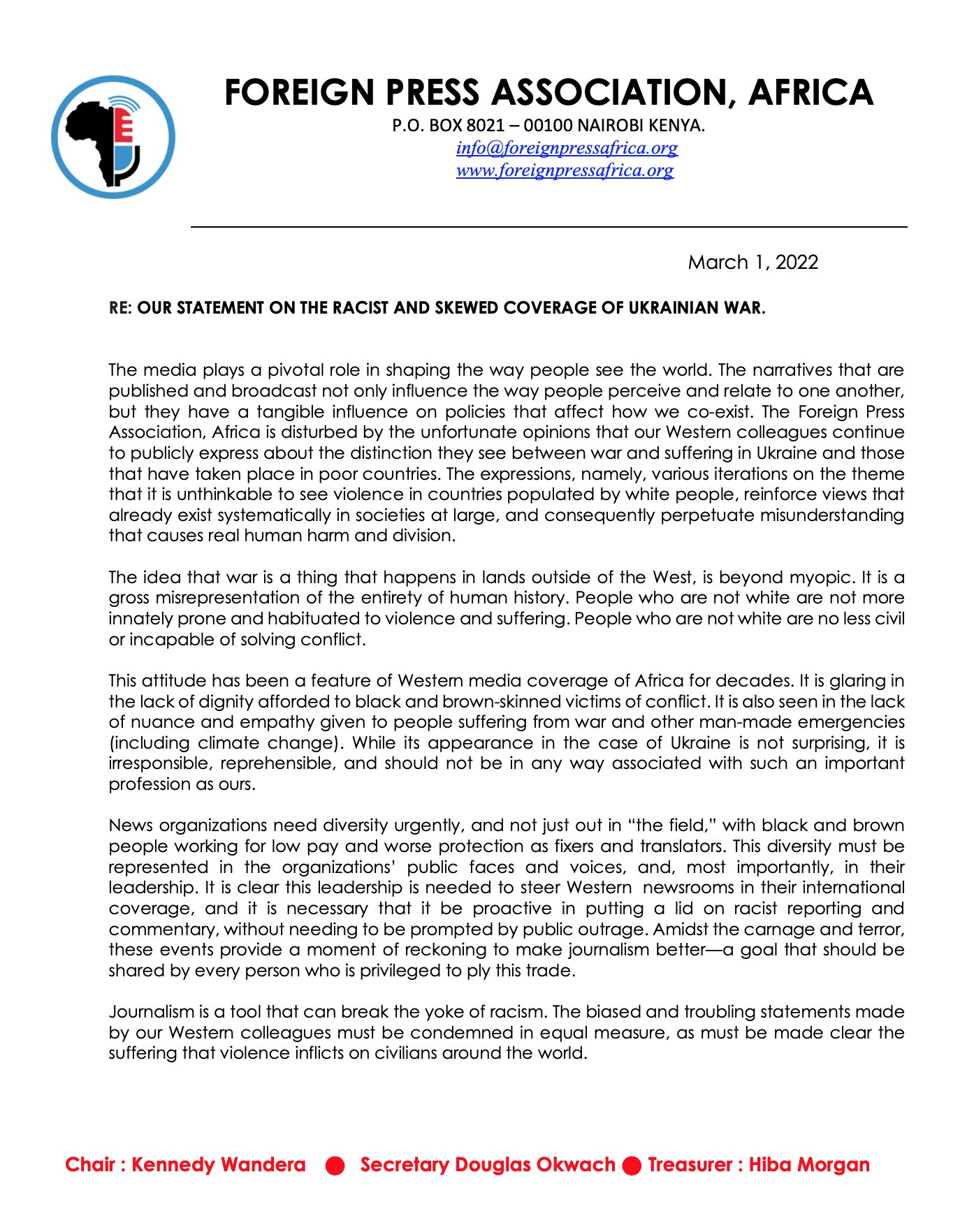
A copy of the statement released by the Foreign Press Association, Africa against "the racist and skewed coverage of Ukrainian war." /FPAA
A copy of the statement released by the Foreign Press Association, Africa against "the racist and skewed coverage of Ukrainian war." /FPAA
"The idea that war is a thing that happens in lands outside of the West, is beyond myopic. It is a gross misrepresentation of the entirety of human history. People who are not white are not more innately prone and habituated to violence and suffering. People who are not white are no less civil or incapable of solving conflict," FPAA asserted.
Emphasizing that this attitude has been a feature of Western media coverage of Africa for decades, FPAA said: "It is glaring in the lack of dignity afforded to black and brown-skinned victims of conflict. It is also seen in the lack of nuance and empathy given to people suffering from war and other man-made emergencies (including climate change)."
Noting that while a similar Western attitude in its coverage of Ukraine is not surprising, FPAA said "it is irresponsible, reprehensible," and that a racist approach should not be in any way associated with an important profession as journalism.
"Journalism is a tool that can break the yoke of racism. The biased and troubling statements made by our Western colleagues must be condemned in equal measure, as must be made clear the suffering that violence inflicts on civilians around the world," it concluded.
Meanwhile, the Arab and Middle Eastern Journalists Association (AMEJA) called on media organizations, particularly the Western ones, to be mindful of implicit and explicit bias in their coverage of war in Ukraine.
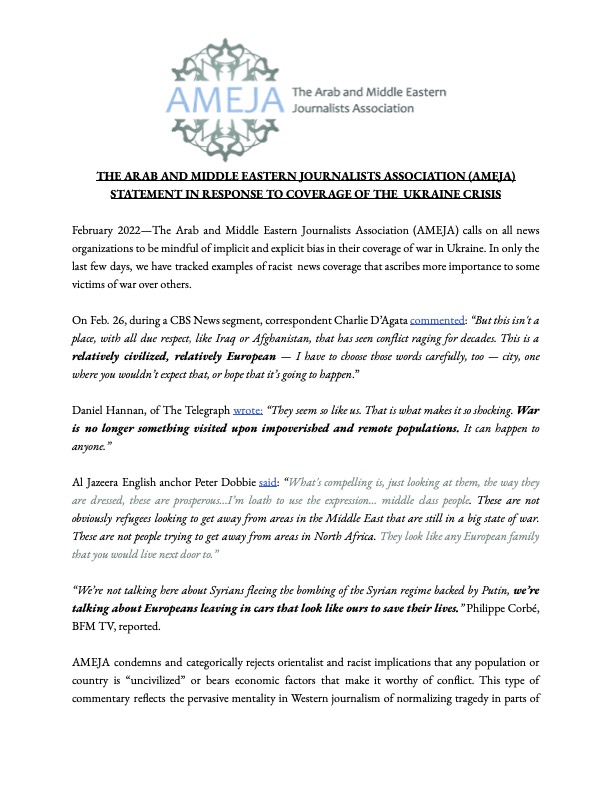
A copy of the first page of the statement released by the Arab and Middle Eastern Journalists Association. /AMEJA
A copy of the first page of the statement released by the Arab and Middle Eastern Journalists Association. /AMEJA
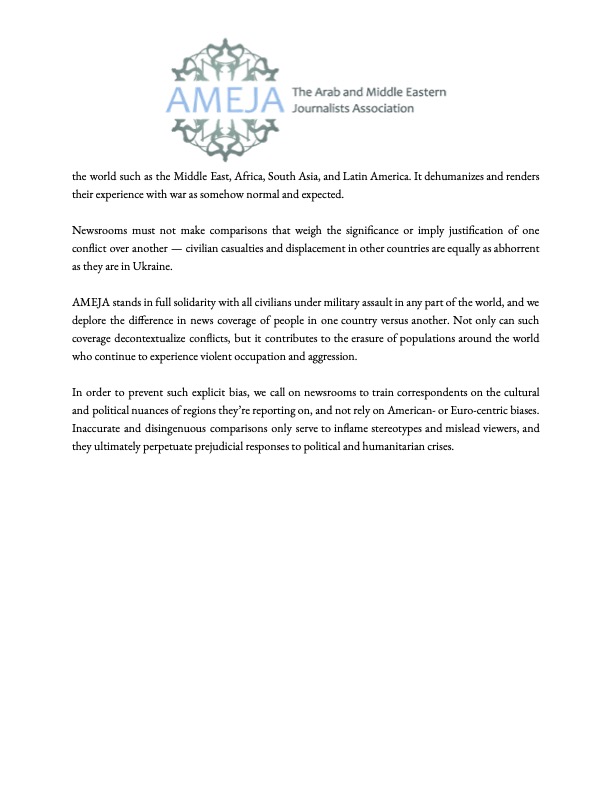
A copy of the second page of the statement released by the Arab and Middle Eastern Journalists Association. /AMEJA
A copy of the second page of the statement released by the Arab and Middle Eastern Journalists Association. /AMEJA
Citing several examples of recent news coverage that ascribed more importance to European victims of war over others, AMEJA in its statement on Tuesday, said it "condemns and categorically rejects orientalist and racist implications that any population or country is 'uncivilized' or bears economic factors that make it worthy of conflict."
"This type of commentary reflects the pervasive mentality in Western journalism of normalizing tragedy in parts of the world such as the Middle East, Africa, South Asia, and Latin America. It dehumanizes and renders their experience with war as somehow normal and expected," the body, representing international journalists of Arab and Middle Eastern descent from around the world, argued.
Media organizations must not draw comparisons that "weigh the significance or imply justification of one conflict over another," it said, asserting that "civilian casualties and displacement in other countries are equally as abhorrent as they are in Ukraine."
The journalists' body said that to prevent explicit bias, newsrooms must train correspondents on the cultural and political nuances of regions they're reporting on, and not rely on American- or Euro-centric biases. "Inaccurate and disingenuous comparisons only serve to inflame stereotypes and mislead viewers, and they ultimately perpetuate prejudicial responses to political and humanitarian crises."
Major news outlets have aired racist views as they covered the Russia-Ukraine military conflict, often using comparisons with the Middle East, and showing more empathy for the Ukrainian and European victims while normalizing the sufferings in other parts of the world. A few samples via screenshots from a Twitter thread exposing the racist undertones:
'All human life should be viewed as equally important'
Explaining the underlying cause behind the explicit and implicit racist biases in media, Marcus Ryder, the head of external consultancies at Birmingham City University's Sir Lenny Henry Center for Media Diversity, told CGTN Digital that "as journalists we are taught to try and find ways to emotionally connect our audience with the stories."
The Ukraine crisis coverage "reveals that unexplored emotional connections can be racially based, although we might not realize it," he added.
Ryder has been a champion of diversity in media and was among the first from the fraternity to call out the obvious racism in the coverage of Ukraine crisis.
In an open letter to the media published in the form of a blog on Sunday, Ryder outlined some key do's and don'ts for media organizations in their Ukraine coverage while highlighting the importance of diversity.
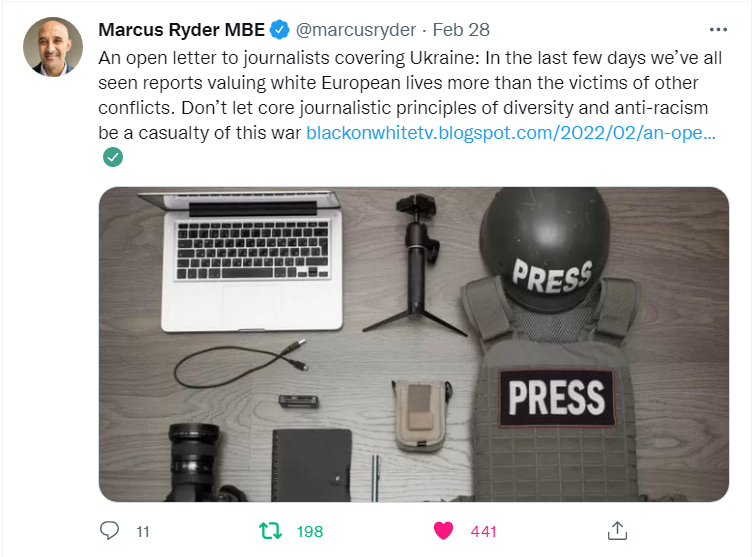
A screenshot of a tweet by Marcus Ryder. /Twitter @marcusryder
A screenshot of a tweet by Marcus Ryder. /Twitter @marcusryder
"A conflict's relative global importance mustn't be confused with the relative importance of the victims of these conflicts," he argued in the blog. "All human life should be viewed as equally important. European lives shouldn't be viewed as having more value than African, Asian, or any other lives around the world."
Deaths in times of war are tragic wherever they occur and journalists must avoid linking their importance, or how much sympathy we have for them, to their ethnicity or regional identity, he added.
Ryder reckoned that while the direct reporting of valuing European lives as being more important may be relatively easy to avoid, journalists must also guard against doing it indirectly.
"We must also be careful of the experts and pundits that we put on our broadcasts when reporting on the news… When an interviewee stresses the importance of the civilian victims by drawing attention to their race the presenter can just gently remind them that 'obviously their lives have value irrespective of what they look like' and move on in a non-confrontational manner," he elucidated.
"The current war in Ukraine could be a seminal moment in how newsrooms respect diversity and incorporate anti-racism into their work," concluded Ryder.
The FPAA statement on the Ukrainian crisis concurred on the need for media diversity. "News organizations need diversity urgently, and not just out in 'the field,' with black and brown people working for low pay and worse protection as fixers and translators," it noted.
"The diversity must be represented in the organizations' public faces and voices, and, most importantly, in their leadership… that can be proactive in putting a lid on racist reporting and commentary, without needing to be prompted by public outrage," the FPAA statement advocated.

